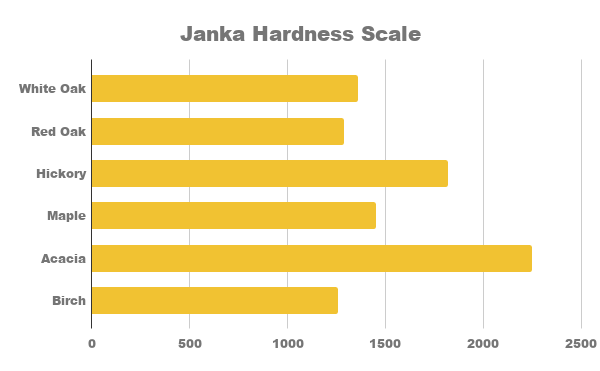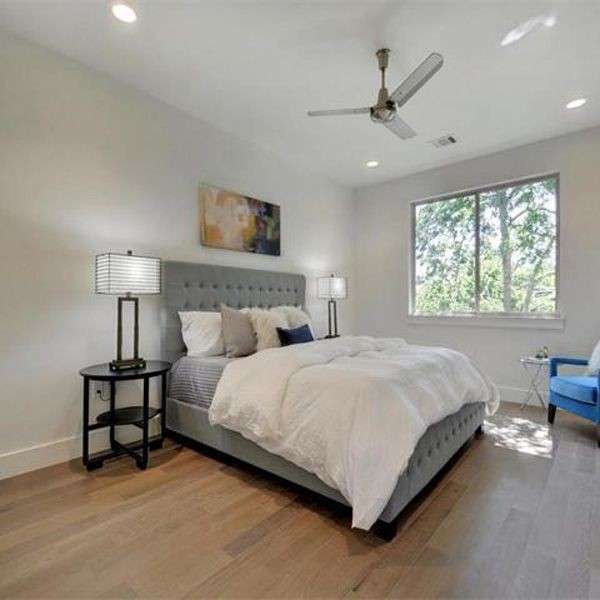
If flooring durability is high on your priority list, then you have officially come to the right place! We’re here to talk about all things durable. Whether it’s a certain hardwood you’ve had your eyes on or an artificial alternative, we’ll give you the breakdown on each.
All you have to do is keep on reading and we’ll make sure to fill you in on the rest. Now, without delay, let’s get going!
What Is Durable Flooring?
If you’re looking for a floor that’s waterproof, can’t easily get scratched or dented, and can hold up to years of wear, then you are in the market for a durable floor.
Floors with this type of definition are not delicate by any means. In fact, they can see years of potentially damaging actions without needing to be replaced. For example, if you have pets or children that are prone to spills, then the need for something a little more sturdy is of high importance.
Five Classes of Durability

Here is a handy breakdown of durable floors using the Janka scale. We've categorized different flooring into 5 classes to help you see the difference. You may be surprised by the results!
- Class One - 2500+ Janka Score: These are the most durable floors you can get. Strand-woven Bamboo, Eucalyptus, and Stone-core are within the top section.
- Class Two - 2000 to 2500 Janka Score: These are more durable. Woods such as cherry and acacia take their rightful place here.
- Class Three - 1300 to 2000: Moderate durability is shown. Oak and hickory represent this class.
- Class Four - 1000 to 1300: While not the most durable, these floors are still plenty tough for a lot of homes. Featuring floors such as Birch and Walnut.
- Class Five - Sub-1000 Janka: This class ranking has very minimal durability. Examples are pine and other softwoods.
The above rankings are able to deliver some insight into how durable specific types are, such as oak and pine. While oak may work better in a home with a more active lifestyle, pine is something that may work well in a less-trafficked environment.
Durability: Solid vs. Engineered
Let’s compare the durability between solid and engineered wood. While they both have some key differences, they each are capable of pulling their weight in the durability category. Follow along to see how they compare and contrast.
- Engineered Wood: What many may not know about engineered wood is that it’s actually made up of two parts. The first is plywood or fiberboard. It also has a slice of hardwood placed on top of it. Engineered wood flooring is real, it’s just a different way of putting together a solid wood floor.
- Solid Wood: In comparison, solid wood is a single piece of wood throughout the floor. When it’s installed, the methods are usually stapled, nailed, or even glued down.
Both of these wood types have their own unique durability, but engineered is typically going to be your more durable choice. In fact, when it comes to solid hardwood in general, there is quite a range in what is seen as durable and what is seen as soft. The findings may even surprise you.
As promised, we're going to discuss durable flooring, not just wood flooring. So feel free to skip around if you already have a strong sense of what you're looking for.
Hardwood

Hardwood is a great choice when it comes to mixing style and durability. Just make sure to study the species you are the most interested in to see if it matches all of your needs. Oak, for example, might, whereas another style may be too soft.
In general, though, if the wood is maintained well, then it can truly last years or even decades. Their only true downfall is susceptibility to water damage and a bit of cracking. However, with the proper cleaning, maintenance, and damage prevention, this shouldn't be anything you need to worry about.
Also, always make sure to choose the right finish to help add to its overall durability score. Plus, a finish can always be retouched a little more easily, whereas the wood itself may require more work.
Stone Polymer Composite (Stone-Core)

Don’t ignore Stone Polymer Composite (Stone-Core) as an option in your home! Aside from its strength, it’s also super affordable and will give you a big return on investment. High-quality Stone-core can be purchased for around $3-$5 per square foot and looks great!
Stone-core is the most water resistant flooring on the market, so it will always retain its color and shape for years and years. Best of all, there are several manufacturers that will offer a 25-year guarantee against the wear and tear of the overall flooring.
Also, this type of flooring is definitely worth considering for your business. This is especially true for a business with higher levels of foot traffic as it's guaranteed to hold up for that type of constant activity.
Wood Polymer Composite (WPC)
If you’re looking for something a little more durable than an engineered hardwood floor, but still want the looks of one, we have you covered! Wood Polymer Composite (WPC) is another great option for even the most demanding areas of your home.
This option is usually a vinyl floor with a waterproof core, but it’s capable of mimicking most other hardwood floor options. A feature such as waterproof alone is great for a kitchen in case of spills or other accidents.
Vinyl

Vinyl is a manufactured option that not only has great strength but also has amazing affordability. Not to mention that there are so many style opportunities available when picking out floors initially. With so many patterns and colors readily available, you can allow your creative side to truly run wild.
One of the best spots for vinyl is the kitchen. It can easily be cleaned and will disguise the look of dust and dirt, so you don’t feel the need to constantly go over the area with a mop or vacuum. And best of all, this manufactured material is completely stain proof and waterproof. Who doesn’t love this combination of benefits?
Vinyl is definitely worth considering for your business too. It's durability gurantees that it will hold up even under heavy foot traffic while keeping the great looks that attracted you to it in the first place.
Bamboo

Believe it or not, but bamboo can actually be an extremely durable hardwood flooring choice. However, bamboo can be very soft or very hard, depending on how it's made. So make sure you check on the specifics before you assume that the floor you're buying will suit your needs.
In addition to its durability, it also offers a clean, modern vibe for those who prefer a minimalistic style. And when the bamboo is finished correctly, it can be cleaned super easily with only a bit of soap and a mop.
Bamboo flooring can even be refinished! However, If the wear layer is too thin, then it may be a better option to replace them instead.
One last consideration is that this type of flooring can be really DIY. As long as it has lamination and a top layer stuck down onto other sub-layers, you’re all set.
Stone
Stone is a great place to kick off the durability list with! Aside from its well-known superior strength, it’s also known as a great option for homes and businesses in much warmer climates.
However, what might shock you is that not all stone is as durable as you might think. It’s only certain types. To be guaranteed with large amounts of strength, it’s important to purchase floors that are non-porous. Examples are stones such as granite, quartz, and slate.
What’s also great about stone is that it doesn’t stain as easily as other flooring choices. In fact, this reasoning alone may make it a great option for families or pet owners. However, it should be noted that stone floors may need to be occasionally resealed.
Cork
If you need environmentally friendly with a good mix of durability, then cork may just be your perfect floor.
You may not think that cork is as durable as it is since it’s so soft under your feet, but rest assured that it can put up with a large amount of wear and tear. Plus, the softness itself is great for achy joints and it can even reduce joint pain in some. So if you stand a lot during the day, then you might want to check it out.
When selecting this option, the one thing to be mindful of is that certain heavy objects may leave dents if dropped or if the floors are not treated carefully. This flooring may have quite a bit of strength, but we won’t say it’s on the same level as a material such as stone.
Floors You Can Trust
Now that you know which floors are the most durable, your search can now be narrowed down a bit more. Durability matters most to those who have a busy lifestyle, a large family, or lots of pets (especially large dogs). Finally, if you have a commercial space in need of a new floor, then a durable floor that can stand up to daily high traffic should be strongly considered.
Let us know what durable floors you have your eye on and which factor/feature convinced you. We’d love to hear your input. After all, at Hardwood Bargains, we want to cater to you!
Sources:
6 of the most durable flooring options for your home | AZ Big Media
Understanding the Durability of Wood - Property Care Association
Uses of Granite: Countertops, Tile, Curbing, Dimension Stone | Geology.com


